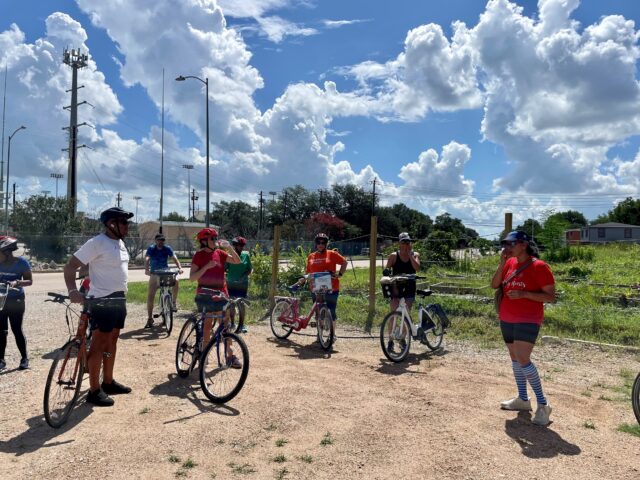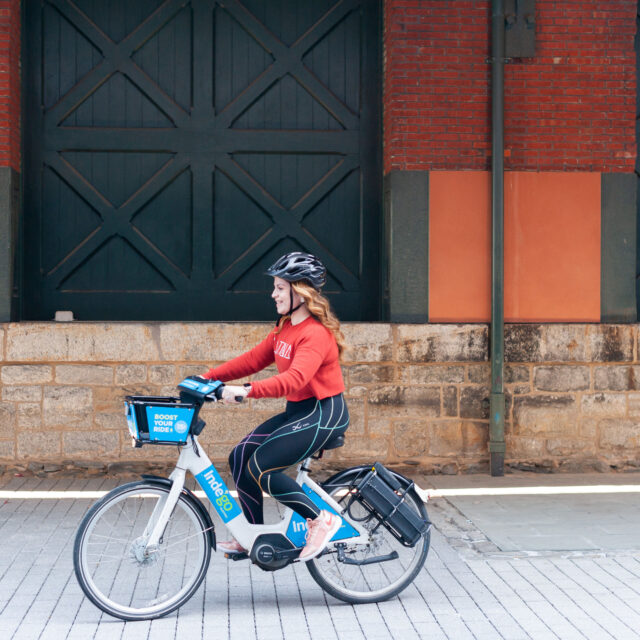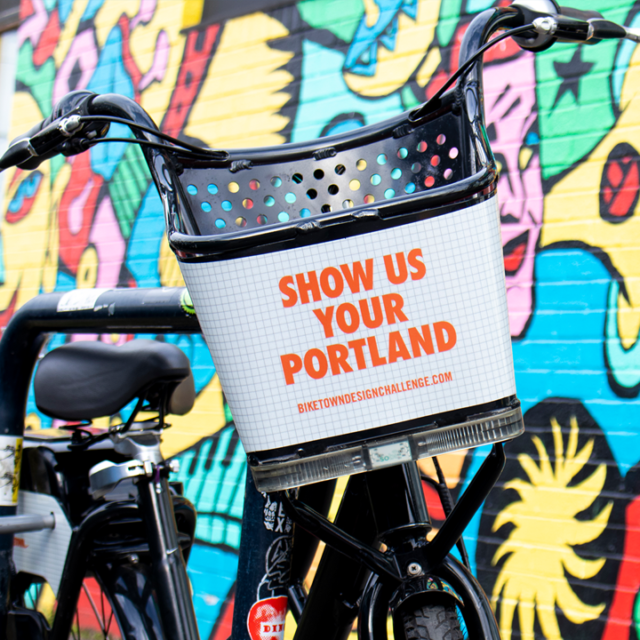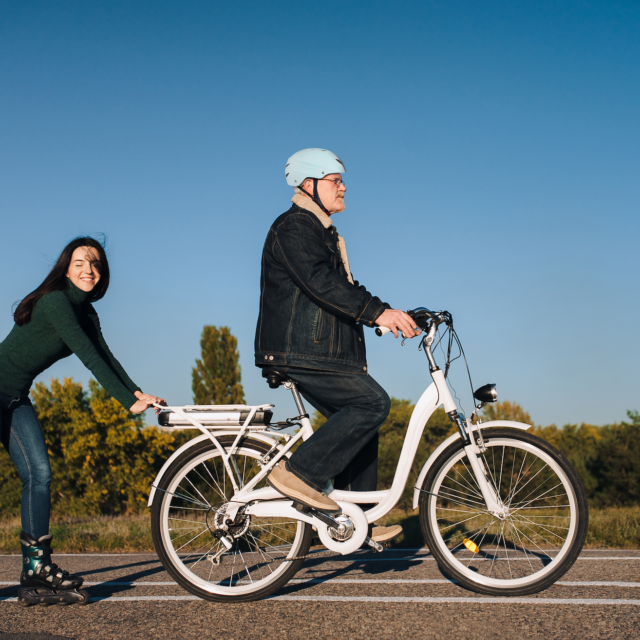In Houston, Bike Share Is Medicine
by Kiran Herbert, Communications Manager
August 10, 2022
Houston BCycle and the American Heart Association’s Bike Rx program allows providers to prescribe bike share memberships to patients with qualifying conditions.

Participants visit a community garden in Houston’s Third Ward on a recent “‘provider ride,” organized by Houston BCycle and the American Heart Association.
There’s no denying that bike share is a boon for public health, providing health benefits for bicyclists that outweigh any associated risks. On average, bike share saves the U.S. $36 million in public health dollars every year, making our systems a great tool for health promotion and prevention. It follows that for those with some chronic health conditions, bike share is one important way to help increase physical activity and lower people’s risk of dying from heart disease, diabetes, and stroke. Most notably people of color and lower-income individuals, who suffer from all three at higher rates.
Prescription bike share programs have been around for some time — Boston’s now-defunct Hubway system launched a program in 2014 and in 2016, New York’s Citi bike system kicked off a prescribe-a-bike program in Brooklyn that’s still enrolling patients. As electric pedal-assist bikes have increased in availability and popularity, however, bike prescription programs have been forced to adapt.
In Portland, Oregon, Biketown’s all-electric bike share system received a $200,000 BBSP Living Lab grant to launch and execute its own prescribe-a-bike program in partnership with the Multnomah County Health Department, Racial, and Ethnic Approaches to Community Health (REACH) Program. And BikeLNK, the bike share system in Lincoln, Nebraska, also has a prescription program dubbed Rx-a-BikeLNK, where those with poor health outcomes can receive a free bike share membership and helmet. Most recently, in February 2022, Houston BCycle announced Bike Rx, which allows providers to “prescribe” people with bike share memberships.
The program is a partnership between Houston BCycle, Legacy Community Health, and the American Heart Association (AHA). The program, which had been in the works for years before coming to fruition, launched after a BCycle station was installed directly outside the Legacy Community Health clinic on Lyons Avenue in Houston’s Fifth Ward, a historically underserved neighborhood. When a patient goes in for an annual exam with their provider, if they have elevated glucose or blood pressure and are still able to exercise, they qualify for the program.
“Patients aren’t just handed a piece of paper but they’re given all sorts of collateral, including flyers on Bike Rx and healthy biking, maps of the area with bike routes highlighted and destinations they can go to, and a helmet,” says Mary DeBauche, director of development and communications at Houston BCycle. “They’re given all kinds of things to make them successful with the Bike Rx program.”
When a patient is given a prescription, a health advocate trained on the bike share program walks them outside to the BCycle station, taking the time to show them how to check out a bike and use the system. Patients are given a key fob, which they can then use to check out any one of BCycle’s traditional or electric-assist bikes at more than 140 stations throughout Houston. While the recommendation is for participants to get at least 150 minutes per week of moderate-intensity aerobic exercise, Bike Rx is really designed to lower barriers to physical activity and promote active transportation in the communities that need it most.
“When you look at who’s most at risk for a sedentary lifestyle, it’s individuals with lower incomes living in areas where there’s no access to physical activity, and those are typically our Black and Hispanic neighbors,” says Emily Paul, community impact director at the AHA and a major player in getting the prescription program off the ground. “Bike Rx hopes to bridge these inequities by enhancing access to physical activity.”
For all parties involved, bike share has the potential to prove a more holistic approach to medicine, taking into account medical and social factors, rather than just the symptoms of disease. The fact that Houston BCycle offers pedal-assist bikes was also a win: Despite being easier to ride, thereby allowing people of all ages and fitness levels to enjoy bicycling, e-bikes have been shown to still offer numerous health benefits. Plus, e-bikes can further help lower the barrier for people to start riding. This is especially true of Americans 65 and older, a population that’s expected to nearly double by 2060.
“We need to have an ethos towards physical activity that is inclusive,” says Lharissa Jacobs, vice president of health strategy at the AHA and another of Bike Rx’s biggest advocates. “It’s not cheating to have a little motor. What’s terrible is everyone not being able to participate.”
In order to continue to expand the program, the AHA recently partnered with BCycle to host a provider ride to raise awareness among the doctors, nurse practitioners, and other medical professionals that are the ones writing prescriptions. That ride was held in Houston’s historic Third Ward, another underserved neighborhood with a clinic that the AHA is hopeful will also adopt the Bike Rx program. Stops along the route included a community garden, a farmer’s market, and even a chess park.
“A chess park builds social well-being and connection, and that’s really important,” says Paul, touching on one of the many ways bicycling can help cultivate community, another crucial health benefit.
As Houston BCycle continues to scale, the hope is for more and more clinics to come on board. Since insurance providers don’t reimburse people for physical activity, funding remains one of the larger hurdles when it comes to expansion or even collecting data on the existing program. Another barrier — especially in Houston — is a lack of a safe, connected bike network, which helps ensure that those who have access to bike share will actually use it.
In many ways, Houston’s Bike Rx program came about because the ecosystem was right: The City of Houston was able to expand some trails, there was political willpower amongst key players, and BCycle’s growing footprint intersected with a willing clinic. The result is a program that improves public health while benefitting the environment and helping to build community. While the program is still small, it’s proof that even in a large, car-centric city in Texas, innovation is possible.
“If everyone in Houston rode a bike, imagine what that would do for our communities,” says Jacobs. “We want everyone to get on a bike to prevent heart disease, but it’s also bigger than that.”
The Better Bike Share Partnership is funded by The JPB Foundation as a collaboration between the City of Philadelphia, the National Association of City Transportation Officials (NACTO) and the PeopleForBikes Foundation to build equitable and replicable bike share systems. Follow us on Facebook, Twitter and Instagram or sign up for our weekly newsletter. Got a question or a story idea? Email kiran@peopleforbikes.org



